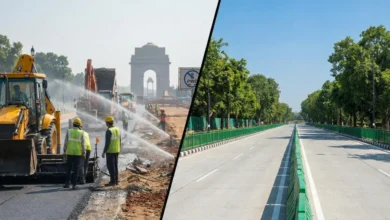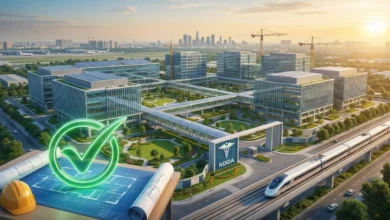YEIDA Gains Ownership of 441 Hectares from 18 Villages Near Jewar

In a major development for the Yamuna Expressway region, the Yamuna Expressway Industrial Development Authority (YEIDA) has finally secured official ownership of 441 hectares of land spread across 18 villages near Jewar. This long-pending transfer marks a crucial milestone in the Authority’s efforts to bring transparency and prevent land-related frauds around the upcoming Noida International Airport area.
YEIDA had acquired the land several years ago from approximately 3,695 farmers for the purpose of urban, industrial, and infrastructural development. While the acquisition process and compensation were completed long ago, the mutation and registry updates were never finalized in government records.
This meant that, on paper, the ownership of several acquired plots still remained in the farmers’ names — despite the fact that YEIDA had paid compensation and planned development on these parcels. This incomplete process left the door open for irregularities and unauthorized activities in the region.
Problems Created by the Ownership Delay
The incomplete mutation created a loophole that led to several issues over time:
- Some individuals illegally sold plots that were already acquired by YEIDA.
- A few others continued farming on the land, even after being compensated.
- In certain cases, land was mortgaged for bank loans, despite already belonging to the Authority.
These irregularities not only delayed developmental work but also risked public land being misused for private gain. For years, YEIDA faced challenges in asserting its legal control over these areas due to the absence of updated official records.
The Recent Move: 441 Hectares Now in YEIDA’s Name
After months of administrative effort, YEIDA officials have completed the mutation process for all 3,695 landowners, successfully transferring 441 hectares of land across 18 villages to the Authority’s name.
According to YEIDA CEO Rakesh Kumar Singh, this initiative is part of the Authority’s ongoing drive to ensure transparent land ownership and prevent future misuse. He added that the completion of these mutations will also make it easier for YEIDA to take physical possession of the land and begin infrastructure projects without legal hurdles.
“This is a crucial step toward strengthening land governance and eliminating fraud in property transactions. It ensures that land meant for public development is protected from unauthorized sales and encroachments,” Singh stated.
Also Read
The transfer of land ownership to YEIDA is expected to have far-reaching implications for both governance and real estate growth in the Yamuna Expressway region.
By updating land records, YEIDA has eliminated loopholes that were previously exploited by middlemen and illegal sellers. Any attempt to sell or mortgage land under YEIDA’s jurisdiction will now be easily identified through official records.
Several industrial and residential projects near the Noida International Airport site were delayed due to ownership disputes. With clear records now in place, the development process can move forward more efficiently.
This move is likely to increase investor confidence in the region. Developers can now engage in projects without the fear of title disputes, while homebuyers and investors can make safer decisions based on verified land ownership.
Why the Mutation Process Took So Long
Officials explained that the delay stemmed from the manual and time-consuming process of updating land records for thousands of farmers. Although compensation and allotments were completed years ago, bureaucratic inertia and administrative delays meant the ownership update was left pending.
Over the years, this oversight allowed for illegal construction, unauthorised colonies, and land sales to flourish, creating a complex legal situation for both YEIDA and the local administration.
Also Read
With ownership now legally transferred, YEIDA plans to accelerate the use of this land for industrial parks, logistics hubs, residential projects, and other infrastructure facilities linked to the Noida airport ecosystem. The Authority has also strengthened its vigilance teams to prevent future encroachments or fraudulent activities.
Demolition drives against unauthorized colonies have already been initiated in parts of the YEIDA region, ensuring that illegal developments do not re-emerge.
Remaining Challenges
While the mutation of 441 hectares is a major success, officials acknowledge that vigilance and enforcement remain ongoing priorities. YEIDA will need to ensure that similar discrepancies do not arise in other land parcels under its jurisdiction.
Moreover, authorities will have to maintain transparency in how this newly registered land is utilized — ensuring that the benefits flow toward planned urban and industrial growth rather than speculative real estate activity.
Also Read
The formal registration of 441 hectares from 18 villages represents more than just an administrative milestone — it’s a symbol of accountability and better governance. By bridging the gap between acquisition and official registration, YEIDA has set a precedent for how development authorities across India can strengthen land management systems.
For the fast-developing Jewar–Yamuna Expressway corridor, this clarity in ownership paves the way for smoother project execution, investor trust, and long-term infrastructure stability.
The challenge ahead will be ensuring that the paperwork translates into on-ground progress — from industrial growth and housing development to job creation and sustainable urban expansion.





